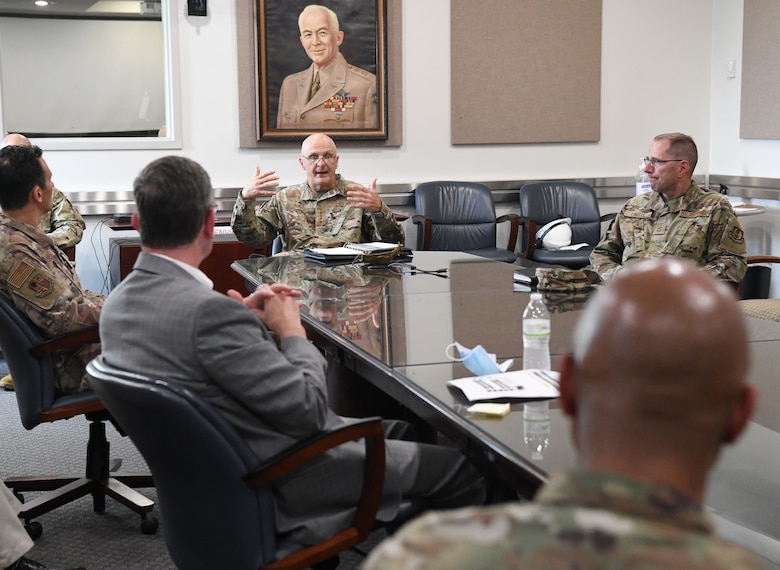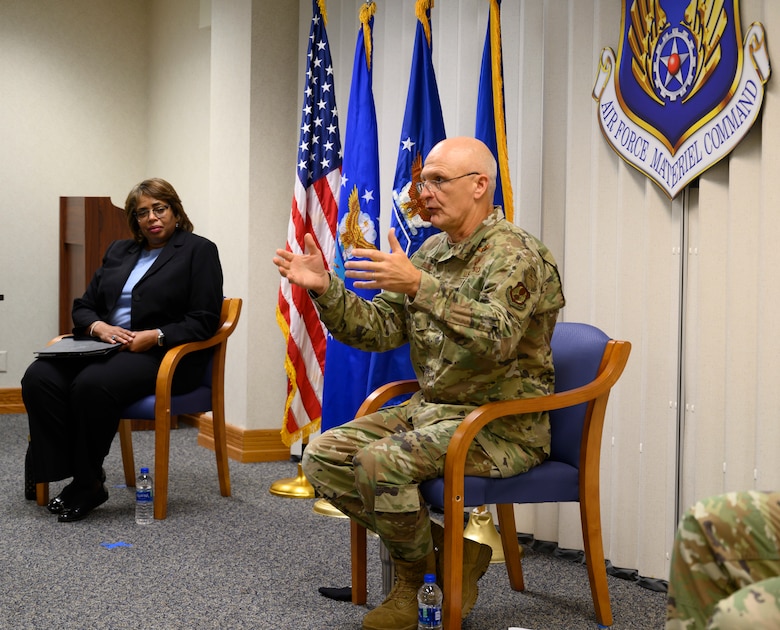As the Department of the Air Force conducts a service-wide review of diversity and inclusion, the Air Force Materiel Command is also taking a look at these issues across the command, with a focus on the overall work climate, barriers to opportunities and identifying areas requiring support and corrective action.
"We have an incredibly diverse workforce at locations across the globe," said Gen. Arnold W. Bunch Jr., AFMC commander. "But, we can't be naïve when it comes to race, biases and inequality. I'm asking our people to open up and have difficult conversations. Only then can we get after those barriers which are in the way of our people rising up to realize their true potential."
Four lines of effort are guiding the AFMC diversity initiative, which include identifying inequalities through qualitative and quantitative data analysis, training in areas such as unconscious bias, establishing command and center councils focused on diversity and inclusion, and ensuring a constant evaluation of success. The ultimate goal is to set the parameters for the command to be a model organization for the Air Force when it comes to diversity, inclusion and equal opportunity across the service.
"Our approach addresses not only the military needs of diversity and inclusion, but also includes unique AFMC focus areas driven by initiatives linked to civilian employment, work culture and inclusion," said Keith Tickle, Air Force Materiel Command diversity and inclusion officer. "Our initial analysis will look at the qualitative data from the DEOCS (Defense Organizational Climate Survey), and FEVS (Federal Employee Viewpoints Survey) as well as information gathered from command-wide sensing sessions, AFMC We Need survey inputs and Installation Barrier Analysis Working Groups. We are also analyzing employment data, civilian equal opportunity complaints and more, to get a holistic understanding of where we are culturally and where we need to go as a command."
As a continuation of the AFMC We Need initiative, multi-disciplinary sensing teams have started visiting several AFMC bases to get direct workforce feedback on diversity, inclusion and equal opportunity. Beginning at an Air Force Sustainment Center air logistics complex this week, the teams are meeting with small and large groups of civilian employees and uniformed Airmen, from new hires to senior leaders, and local American Federation of Government Employees union leaders, to gather information on a variety of issues including workplace culture, hiring, promotions, awards and professional development opportunities.
The sensing-session feedback, along with the results of the data analysis, will drive future training and development initiatives across the command. Already, a cohort of 30 individuals from across the command are enrolled in Cornell University's online Diversity and Inclusion Certification Course. Upon graduation, these individuals will develop a curriculum to train others across the command, focusing on unconscious bias, improving engagement and fostering inclusive work environments.
"We expect to debut a pilot training program in late September," Tickle said.
Diversity and inclusion topics were also part of the recent AFMC Squadron Leader Orientation courses, and efforts are underway to ensure these subjects are part of the upcoming Agile Patriot Professional Development course, the AFMC Supervisor Development course and in all facets of AFMC training.
"We are working to develop a customizable diversity and inclusion curriculum that best meets the diverse needs of our command and addresses tactical, operational, and strategic levels of unconscious bias," Tickle said.
The command is also looking at specific ways to incorporate better diversity and inclusion in recruitment, hiring and workforce retention. AFMC center recruitment teams are working to offer on-the-spot job offers during recruiting events, and plans are in progress for the implementation of a diversity-focused talent sourcing strategy for AFMC positions across the mission set. In addition, the command will continue to evaluate how we can better enable diverse representation in the civilian leadership ranks.
While analysis and training are the current focus, the diversity teams are also looking at how to measure the success of these initiatives across the command and Air Force as a whole. To 'move the diversity needle' in a positive direction means to ensure AFMC maintains an inclusive, diverse workforce culture that promotes trust and ensures all have the opportunity to grow and succeed.
"This is about our mission, but it's also much more than that," Bunch said. "Building inclusive teams, facilitating difficult conversations within the workforce, articulating the benefits of becoming a more diverse organization and implementing best practices that promote a positive workplace culture will help get AFMC where we need to be. Our goal is simple: create an environment where every Airman feels accepted, valued and can achieve their full potential. For D&I to become part of our cultural DNA, I need everyone's buy-in to make that happen."

Gen. Arnold W. Bunch Jr., center, commander, Air Force Materiel Command, initiates a discussion about diversity and inclusion with Arnold Engineering Development Complex (AEDC) senior leadership, July 8, 2020, at Arnold Air Force Base, Tenn., headquarters of AEDC. Also pictured, Chief Master Sgt. Stanley Cadell, right, command chief, AFMC. Bunch and Cadell also held a diversity and inclusion discussion session with members of AEDC, including uniformed Airmen, Department of Defense civilians and contractors. (U.S. Air Force photo by Jill Pickett)

Teresa Bickett, Deputy Director, Financial Management, Air Force Materiel Command and Gen. Arnold W. Bunch, Jr, Commander, AFMC, conduct a Diversity and Inclusion Sensing session with the virtual Squadron Leader Orientation course attendees at Wright-Patterson Air Force Base, Ohio, July 17, 2020. More than 60 Air Force leaders were present for the session which explored how to conduct crucial conversations about diversity within an organization. (U.S. Air Force photo by Richard Hoiles)
Gen. Arnold W. Bunch Jr., commander of Air Force Materiel Command, addresses the workforce on diversity and inclusion at Wright-Patterson Air Force Base, Ohio, June 10, 2020. (U.S. Air Force video by Christopher Decker)






